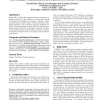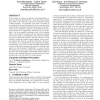93
Voted
ATAL
2006
Springer
15 years 4 months ago
2006
Springer
Being able to realistically simulate humans in emergency response activities is a key challenge for advancing the field of information technology for emergency response. Building ...
87
Voted
ATAL
2006
Springer
15 years 4 months ago
2006
Springer
Intelligent agents are typically situated in a social environment and must reason about social cause and effect. Such reasoning is qualitatively different from physical causal rea...
94
Voted
ATAL
2006
Springer
15 years 4 months ago
2006
Springer
In this paper we incorporate autonomous agents' capability to perform parallel interactions into the cooperative search model, resulting in a new method which outperforms the...
105
Voted
ATAL
2006
Springer
15 years 4 months ago
2006
Springer
In this paper we produce complexity and impossibility results and develop algorithms for a task allocation problem that needs to be solved by a group of autonomous agents working ...
105
Voted
ATAL
2006
Springer
15 years 4 months ago
2006
Springer
Modular robots represent a perfect application scenario for multiagent coordination. The autonomous modules composing the robot must coordinate their respective activities to enfor...
ATAL
2006
Springer
15 years 4 months ago
2006
Springer
A strength of commitment protocols is that they enable agents to act flexibly, thereby enabling them to accommodate varying local policies and respond to exceptions. A consequent ...
94
Voted
ATAL
2006
Springer
15 years 4 months ago
2006
Springer
In this paper, we present an architecture for software agents that enables them to learn vocabulary through the observation of each other bodies and actions. Besides sensors, effe...
101
click to vote
ATAL
2006
Springer
15 years 4 months ago
2006
Springer
There is a recent trend of extending epistemic logic (EL) with dynamic operators that allow to express the evolution of knowledge and induced by knowledge-changing actions. The mo...
90
Voted
ATAL
2006
Springer
15 years 4 months ago
2006
Springer
This paper presents complexity results for model checking concurrent programs against temporal-epistemic formulae. We apply these results to evaluate the complexity of verifying p...
95
Voted
ATAL
2006
Springer
15 years 4 months ago
2006
Springer
We present an OBDD-based methodology for verifying time, knowledge, and strategies in multi-agent systems specified by the formalism of interpreted systems. To this end, we invest...


